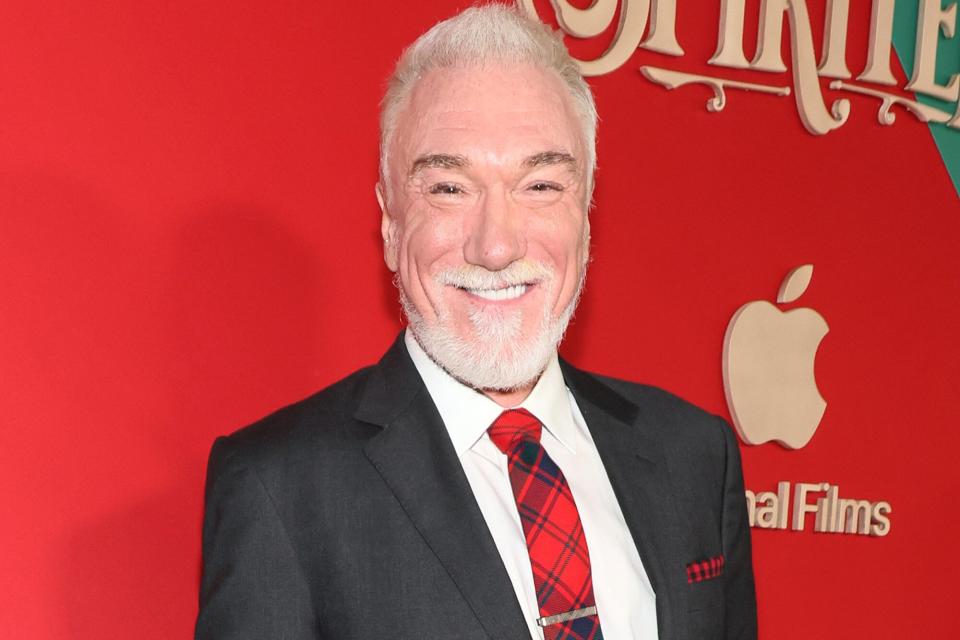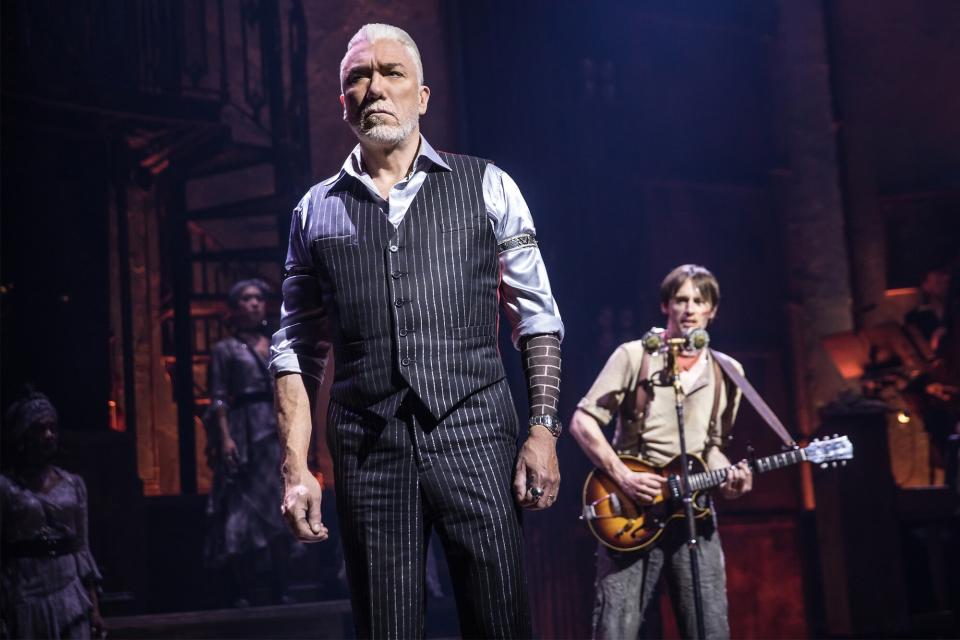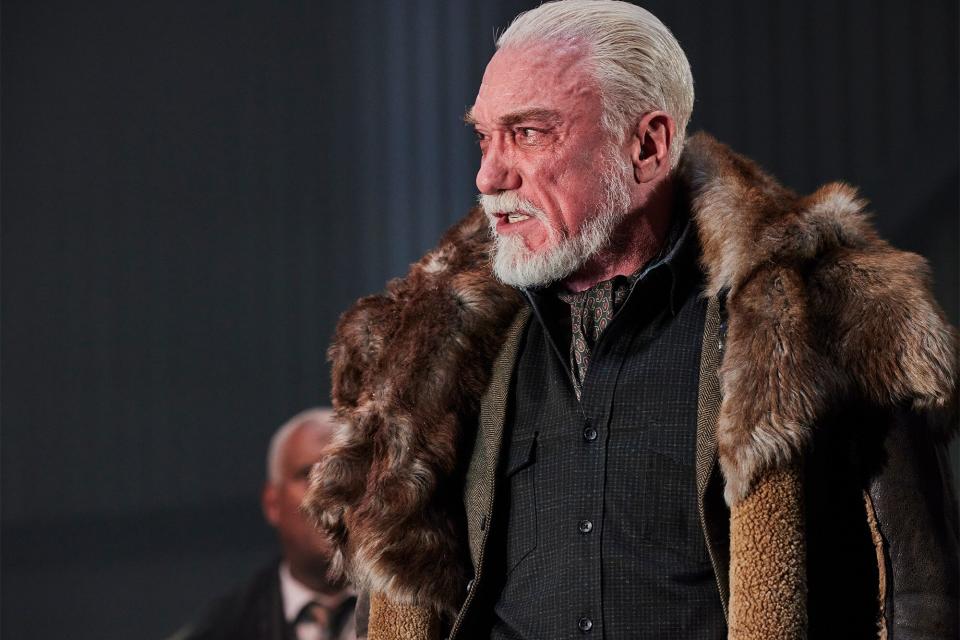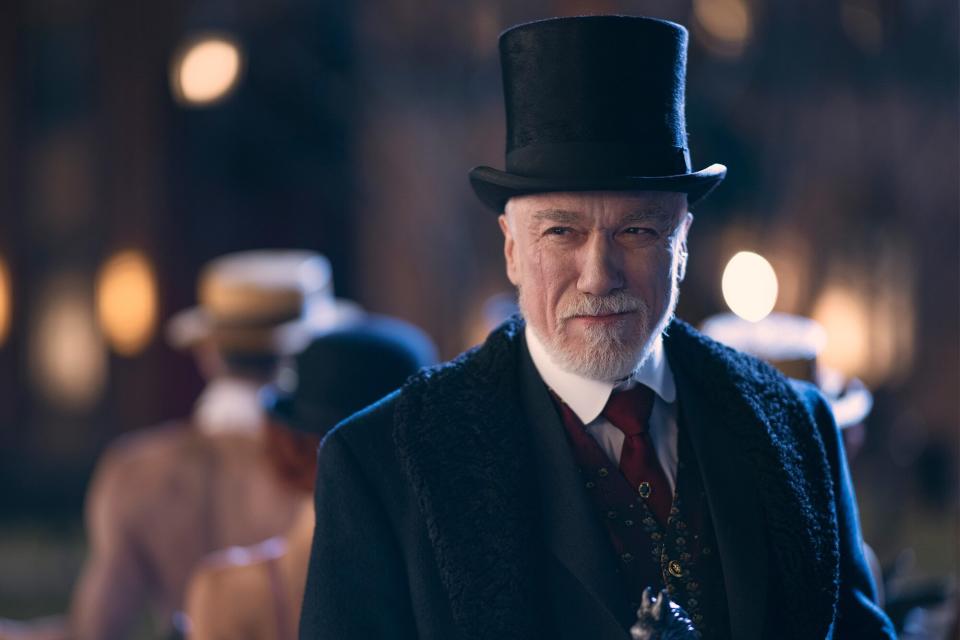Schmicago star Patrick Page is having a moment — and he's ready to make the most of it
With his velvet growl and his predilection for portraying villainy, Patrick Page is hitting his stride.
The silver-haired actor has worked steadily on stage for years but his turn as Hades in Broadway's Hadestown, which earned him a Tony nomination, brought his extraordinary bass voice to global notice. Now, at 60, he's working more than ever. Audiences can currently see him as Octavius Kratt on the second season of Apple TV+'s Schmigadoon, aptly retitled Schmicago in deference to its move to satirizing musicals of the '60s and '70s.
On April 17, he wrapped a run in Shakespeare Theater Company's production of King Lear, which extended three times and earned raves for Page's portrayal of the titular ruler. Since he started his run in workshops of Hadestown six years ago, his work has expanded to film (In the Heights, Spirited) and television (in addition to Schmicago, he'll reprise his role as Richard Clay on season 2 of The Gilded Age).

Netflix Patrick Page on 'Spirited' red carpet
"My whole life I wanted to play King Lear at a great theater, in a great production," he tells EW. "I dreamt about it for a long time. In my life, I wanted to be involved in something like Schmicago. I would watch Christopher Guest movies, Waiting For Guffman, and thought, 'Oh, that looks like heaven for an actor. And I'd wanted to be in a major period television show. I would watch Downton Abbey, and think, 'Oh my god, wouldn't it be wonderful to be in something like that?' So the fact that I get to do all of those things at once is a dream come true."
In a wide-ranging conversation a few days before Page finished Lear, we discussed everything from reaching this career high at the age of 60, what he hopes for the future of King Lear, how Succession influenced his Lear, and what is coming in season 2 of The Gilded Age.
ENTERTAINMENT WEEKLY: Whether it's Shakespeare, musical theater, or television, you have a real knack for playing villains. What appeals to you about exploring all of these baddies?
PATRICK PAGE: There's probably a couple of reasons I get asked to do it a lot. One has to do with physiognomy and my voice and so on. But the other would probably have to do with the fact that I never think of them as villains. I suppose when I'm playing someone like Octavius Kratt in Schmicago. I want to fill out the silhouette of what it means to be a kind of a monster, a nightmare creature that doesn't exist in reality, but exists in our dreams. But the rest of the people that I play, I look for what's broken in them. I look for the part of them that's hurt, and then I look for how they're mistakenly trying to fill that broken part. I look for the accident, the place where they made the wrong turn. Because we can all make a wrong turn. That's what interests me about playing them. Even if they're drawn from cartoon sources like Scar [in The Lion King] or Norman Osborn/the Green Goblin [in Spider-Man: Turn Off the Dark], I still take their brokenness just as seriously as I do if I'm playing Richard III.
Do you think that the reason people keep coming to you for these roles is that once somebody knows you're good at something, they want to keep it going? Is it because we like to think of villains as people with deep voices for some reason?
People worry about actors getting typecast, and I suppose it can be a concern. For me, it's wonderful to have a niche, so that when something like Schmigadoon. comes up, someone as gifted and prolific as Cinco Paul will think of me for that role. Of course we have our ideas about what a villain looks and sounds like, and those are drawn from archetypes, and I'm attracted to archetypes. I have a deep voice and I have high cheekbones, and there are all these different things about me that may fit into that archetype. And that's swell. The thing I hope that doesn't happen and that hasn't happened so far, is that it prevents me from doing other work. So I'm grateful for those people who say, 'Oh, look, I think he should play Valentina in Casa Valentina, or I think he should play Lumiere in Beauty and the Beast."

Patrick Page as Hades in 'Hadestown' on Broadway
You mentioned that Lear is something you've wanted to do for a while. How long and why was now the right time?
I studied Lear first in college, in undergraduate. I played Lear when I was 22 at Whitman College. It was in playing the part that I first understood the true greatness of Shakespeare because it was the first time I had been able to be inside the character's mind in that way. I had played smaller parts in Shakespeare. But to play one of the great tragic parts is to stand inside Shakespeare's consciousness and to look out from the inside. And it just blew me away. I thought that there's really nothing more valuable I could do with my life than get good at this so that I could share these insights with other people. Lear was the play that did that for me, and I wrote my senior thesis on that experience. Over the years, I would keep reading the play, watching productions — it's an ongoing relationship that I've had for 40 years. When Simon Godwin, who is the artistic director of the Shakespeare Theater, called me and suggested King Lear and that he had in mind this very lean, vigorous production. I said, yes, and I'm so happy I did, because I found things about this play that I've lived with for so long. I've found a whole new understanding and a new respect for it and love.

Patrick Page as King Lear
Since Succession premiered, there's been so much talk of King Lear. Was that at all a reference point for you? Or Brian Cox in that?
Well, that's the other thing that makes it so relevant right now, the popularity of that show. The show, of course, is based on King Lear, not the other way around. People will say, 'Oh, King Lear reminds me of Succession, and I'll go, "Really? Maybe Succession reminds you of King Lear." But I think a show like that can crack the play open and ask you to look at it fresh and place it under the microscope of modern behavior, which I believe we've done with this production. So, I do think it's an influence for me. The work in that television series is so realistic and detailed, the way it's shot allows them to act it in such a naturalistic fashion. The actors are so skilled. I do think it sets a bar that we can all aspire to, including in our classical work.
What have you learned about yourself in playing Lear?
How tenacious my ego is. No matter how selfless I've tried to become, just how persistent my ego is. That's the bottom line in King Lear because King Lear is about a man being stripped of his ego, of all of the various roles and masks. The ego is the mask of King, Ruler, the mask of Father, and what's left when all of that's stripped away and how terrifying it is to be left with nothing but your simple human presence. And can you be okay with that?
You've also been very honest on social media and in interviews about your mental health. Does taking on a role like this create extra obstacles or challenges? Do you have to put certain things in place to make sure that doesn't happen?
I felt it was actually therapeutic. I was fearful that it might be triggering of my depression or my anxiety. In fact, with momentary exceptions it's done the opposite, which is that by acting out those fears in Lear's imaginary world, I tend to be freer of them in my daily life.
Switching to Schmigadoon, tell me more about playing in the world of Schmicago.
It was just so wonderful. First of all, to be surrounded by the people that I was surrounded with. I'm just a fanboy on the set. This is heaven for a theater kid like me, who grew up listening to cast albums. Then there's the material itself, all of the little references that you get to play with. It was joy in every way.

Robert Falconer/Apple TV+ Patrick Page as Octavius Kratt on 'Schmigadoon!'
Is it difficult straddling that line of satire of musical theater and genuinely playing the thing?
It's so funny, isn't it? Because I've had someone say, 'Oh, Kratt is just basically Hades.' And I'm like, 'Oh, I hope not.' I hope I wasn't quite that pompous and selfless as Hades but maybe I was. There's a very fine line between playing an archetype and playing a caricature.
You pay homage to Judge Turpin's "Mea Culpa" from Sweeney Todd, which is often cut from the show.
It's so funny because when it was in the script for me to pull out that whip, of course I laughed like crazy when I read it. But there were many people on set that day who were like, "What the hell is he doing?"
All things point to Octavius Kratt being the villain of the season.
You think?
Is that fair?
Cinco's a very clever writer. He could end up being a lovely guy at the end.
If they have season 3, Les Schmigarables or or whatever they title the age of the mega-musical, would you come back?
Can you put my "yes" in bold caps?
You've wrapped production on season 2 of The Gilded Age. Can you tease it at all?
You get to know Richard Clay a a bit better. He starts moving from the background into the picture. The relationship with George Russell (Morgan Spector) starts to come more into focus. Also, the resonances to our modern world, to the current labor movement and the labor movement of the 19th century and all of that is coming more into focus. That will interest people a lot. I thought the first season was absolutely beautiful and of course was nominated for awards for the design and all of that. But when I looked at the second season, I find it to be even more lush and more inviting and more beautiful, aesthetically. It's a world I want to step into.
Sign up for Entertainment Weekly's free daily newsletter to get breaking TV news, exclusive first looks, recaps, reviews, interviews with your favorite...stars, and more.
Related content:

